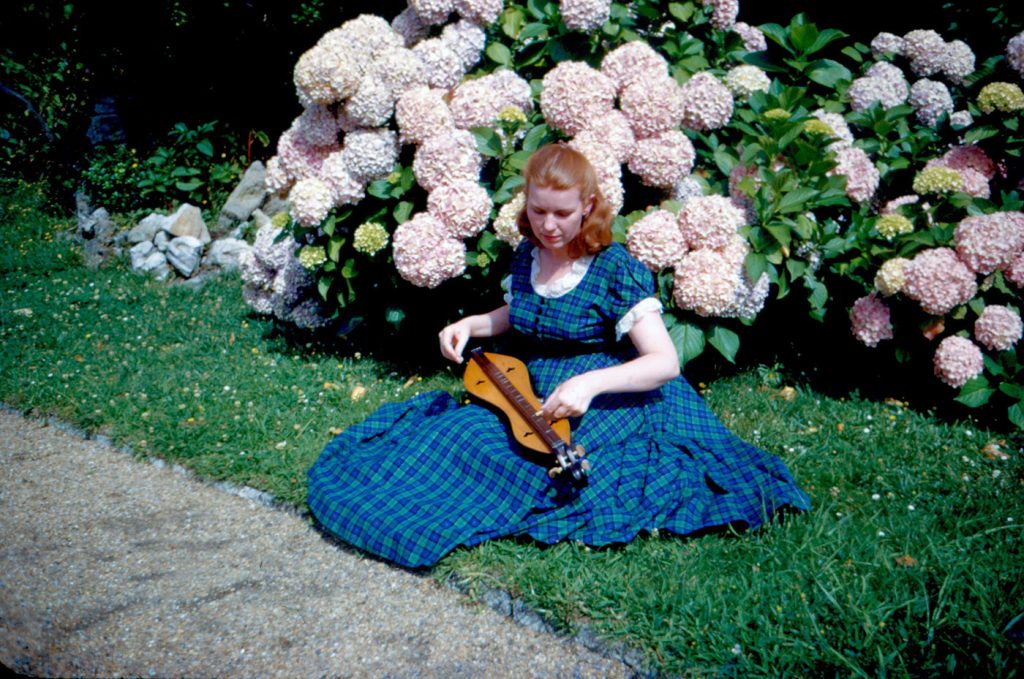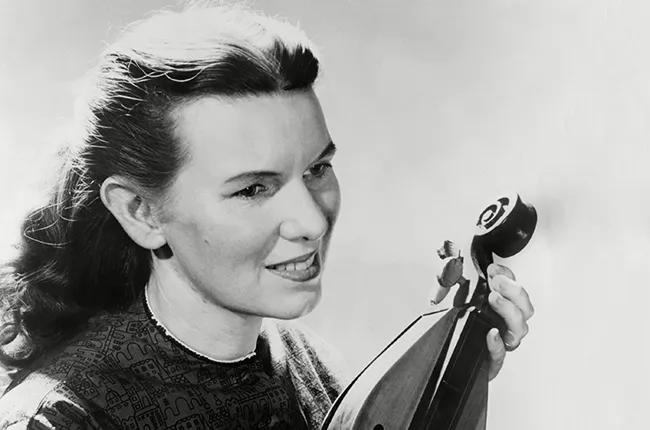Solo legacy artist Jean Ritchie is the subject of part ten of our FARHOF series. A solo legacy artist is a performer whose initial impact on the genre was at least 45 years prior to the year of Induction.
Singing came naturally to Jean, as naturally as breathing air back in Viper, Perry County, Kentucky. She was born there on December 18, 1922. Folk song scholars have recognized the Ritchie family as one of the great ballad-singing families of Kentucky.
In the documentary film Mountain Born: The Jean Ritchie Story, Jean would recall:
We sang sort of to accompany the things that we did, accompany our lives, I guess There was no teachers of singing. People just sang as a natural thing. The way they heard it from their mothers and fathers and grandfathers and grandmothers.
She learned hundreds of folk songs in this manner. Some called her “the Mother of Folk” because of her extensive knowledge of songs and her willingness to share them with a wide audience.
Jean learned to play the mountain (or Appalachian) dulcimer from her father and uncle. She almost single-handedly revived interest in the dulcimer by playing it while performing for audiences and on her albums. She wrote an instructional book entitled The Dulcimer Book and made dulcimers with her husband, George Pickow.

Jean graduated with a degree in social work from the University of Kentucky in 1946. She moved to New York City shortly thereafter. It was there Alan Lomax recorded her for the Library of Congress. Soon, she was performing for the informal gatherings in the city’s folk scene.
Always curious and eager to learn more about the music she loved, Jean obtained a Fulbright Scholarship in 1952 to travel about Britain, Scotland, and Ireland. Once there, she spent 18 months tracing the roots and origins of some 300 songs she learned from her family. When speaking with the local people about the songs they knew, she would often ask about the song “Barbara Allen.” Jean’s performing and recording of the ballad brought it new interest.
“Barbara Allen” dates back to the 17th century. There are many variations of the lyrics but they all essentially tell the same story. A young man is in love with a maiden named Barbara Allen. As he lay dying he sends for her. She comes reluctantly and tells him his death is of no concern to her. Heartbroken, the man dies. Barbara Allen then regrets she was so callous to one who loved her so. She falls ill and dies but not before she asks to be buried next to him.
Another song Jean Ritchie promoted was the traditional Appalachian ballad “Shady Grove.” Doc Watson, who likely learned it from Jean, later popularized it. The lyrics describe “the true love of a young man’s life and his hope they will wed.” It is believed to have originated in eastern Kentucky early in the 20th century. As with “Barbara Allen” and many other traditional ballads, many variants exist.
Jean also performed songs of her own composition. She would focus on the difficulties of mountain living in her songs. “Black Waters” took the mining companies to task for their strip mining practices that destroyed the Kentucky mountains and polluted the waters. The closing of Louisville and Nashville railroad stations and their impact on the local economies and unemployment was the subject of “The L&N Don’t Stop Here Anymore.” Johnny Cash recorded a version of this song.
Her approach to songwriting was unique. She would alter tuning from one verse to the next in a song and lyrics from one performance to the next. It was an approach Jean learned from her uncle Jason. She embraced his approach and by doing so learned to accept improvisation and variation as natural elements of traditional music.
Counted among her friends were Woody Guthrie, Pete Seeger, and Oscar Brand in addition to Alan Lomax. Jean influenced a generation of folk singers in the 1960s who also covered her songs, including Joni Mitchell, Bob Dylan, Joan Baez, and Emmylou Harris.
Jean Ritchie has recorded more than 30 albums and authored seven books about folk music and her family. In addition to her Fulbright fellowship, Ritchie received the National Endowment for the Arts’ Bess Lomax Hawes National Heritage Fellowship and the Folk Alliance Lifetime Achievement Award.
Her dulcimer case is in the Smithsonian’s National Museum of American History. The stickers on her case record the events she attended and ideas she supported as a folk musician.
In December of 2009, Jean was hospitalized after suffering a stroke. Her ability to communicate was impaired, although she did recover to some degree. She had been living in Port Washington, NY but moved to her home in Berea, KY. It is there she spent quietly living the last few years of her life. It is said she was being taken care of by family and friends and remained in good spirits.
Jean Ritchie died at her home in Kentucky on June 1, 2015 aged 92. She will be remembered not only for her many contributions to folk music but for awakening an interest in the music of Kentucky. And with her own compositions, she has proved an important spokesperson for the inequities of the Appalachian region.
Next up – Odetta


